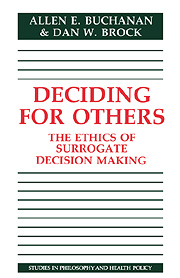Book contents
- Frontmatter
- Contents
- Preface
- Dedication
- Introduction
- Part one Theory
- Chapter 1 Competence and incompetence
- Chapter 2 The primary ethical framework: patient-centered principles
- Chapter 3 Advance directives, per son hood, and personal identity
- Chapter 4 Distributive justice and the incompetent
- Part two Application
- Looking forward
- Appendix one Living trust and nomination of conservatorship
- Appendix two Durable power of attorney for health care
- Notes
- Index
Chapter 1 - Competence and incompetence
Published online by Cambridge University Press: 05 June 2012
- Frontmatter
- Contents
- Preface
- Dedication
- Introduction
- Part one Theory
- Chapter 1 Competence and incompetence
- Chapter 2 The primary ethical framework: patient-centered principles
- Chapter 3 Advance directives, per son hood, and personal identity
- Chapter 4 Distributive justice and the incompetent
- Part two Application
- Looking forward
- Appendix one Living trust and nomination of conservatorship
- Appendix two Durable power of attorney for health care
- Notes
- Index
Summary
The doctrine of informed consent in medicine requires respect for the informed and voluntary treatment choice of a competent patient. This book develops a theory of decision making for incompetent persons. Thus, a crucial issue at the outset is how to determine who is properly deemed incompetent and thus as falling under our theory. As will become clear in this chapter, that is a far more complex question than may at first be apparent. In particular, the determination of competence is not simply an “objective” factual determination based on some measurable property of an individual. Nor is its complexity simply psychological or more broadly empirical and so to be sorted out by psychologists or psychiatrists before the ethical and legal analysis comprising a theory of decision making for incompetents is done. Instead, an analysis of competence determination is one central part of the ethical and legal analysis in a theory of decision making for incompetents.
Clarity about determinations of competence and incompetence requires distinguishing carefully among the following questions:
(1) What is the appropriate concept of competence?
(2) Given an analysis of the appropriate concept of competence, what standard (or standards) of competence must be met if an individual is to be judged to be competent?
(3) What are the more reliable operational measures or tests for ascertaining whether a given standard of competence is met?
(4) Who ought to make a determination of competence?
(5) […]
- Type
- Chapter
- Information
- Deciding for OthersThe Ethics of Surrogate Decision Making, pp. 17 - 86Publisher: Cambridge University PressPrint publication year: 1990
- 1
- Cited by



